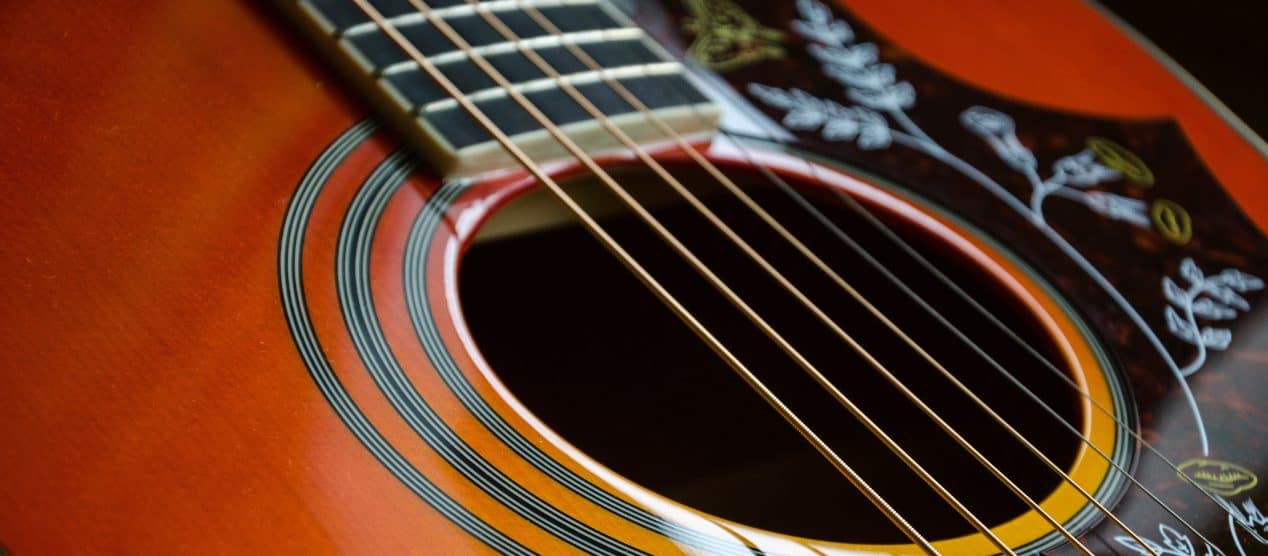Plain Steel Strings don’t get nearly the attention of their wound counterparts, but they’re definitely worth talking about! In this video, we cover the most common questions and misunderstandings related to plain steel strings.
Be sure to subscribe to our YouTube channel to keep up with more great videos like this one:
Transcription
What’s up everybody, I’m Scott from String Joy Guitar Strings in Nashville, Tennessee. Today, we’re answering your top questions about plain steel strings.
I’m actually really glad we’re doing this video. A lot of times when we’re talking about guitar strings on this channel, we’re focusing a little bit more about the wound strings than about the plain steel strings, and that’s pretty typical for most guitar string companies. The reason really is there’s just a lot more that goes into the wound strings, there’s a lot more differences from company to company when it comes to wound strings as well. So it’s only natural that that’s more what we’re gonna focus on when we’re talking about what makes our strings different from one another. But plain steel strings are also really important and there’s some stuff that a lot of players don’t know about ’em that we’re gonna answer today.
So without further ado, let’s jump into it. The first question we’re going to answer is what are plain steel strings made out of? Alright, so this question might seem a little bit obvious, it’s probably no surprise to you that plain steel strings are indeed made out of, you guessed it, steel. But it’s actually a particular type of steel, it’s called music wire and it’s a tempered high carbon steel, which makes it very, very strong and capable of having different amounts of tension applied to it, which is why it’s really good at doing its job.
Plain steel guitar strings need to be really strong even at very, very narrow diameters in order to keep up tension and not break on you, and music wire is fantastic about this. It’s more or less the same material that’s used in piano wire as well, and basically the same material that’s used as the core for guitar strings also. So it really is good at doing its job. It’s held up for almost two centuries now that we’ve been using it, and it’s always kicked butt at the one thing that it’s really good at, which is being really, really strong.
The next question we get a lot is whether you can use a plain steel string that’s intended for electric guitar on an acoustic guitar or vice versa. Can you use it a plain steel string from an acoustic guitar string set on an electric guitar? Well this is actually one of the least understood parts about plain strings and I’m really excited to be able to tell a lot more people about it through this video, but yes, there’s no fundamental difference between a plain steel string that’s featured in an electric guitar string set versus one that’s used in an acoustic guitar string set.
The big difference is that you’ll see between these two different things are really just the gauges. If you have a 12 from a light gauge acoustic guitar string set, and you wanna use that as a substitute for the B string on like a set of nines or something like that for electric, it will work great. There’s really no difference about them at all, they’re using the exact same wire, the twist lock happens in the exact same way. There’s really, truly no big differences between what’s good for electric and what’s good for acoustic when it comes to plain steel strings, so if it’s convenient to swap out because you just broke a string and really need one, swap away and don’t worry about it at all.
So why are plain steel strings made out of steel? Why don’t we make them out of nickel or bronze or brass, or anything like that? Well the real reason is steel’s just the only material that makes sense to use on a guitar string set that has the tensile strength necessary to work as a plain steel string. All those other alloys do a really good job as wrap wire being wrapped around a strong steel core, and just being there for resonance and tone and all that sort of good stuff, but they would not hold up as plain strings at all, that’s why we use steel.
One misconception I see a lot and I see why a lot of people have this misconception, is when it comes to sets like pure nickel sets. So you’ve probably heard of pure nickel, and if you look at those words you probably would assume that that means every single string in the set is made out of 100% nickel. Well again, that’s not true at all, it’s only referring to the wrap wire on the wound strings, instead of being an alloy or a nickel plated steel or something like that, the wrap wire on pure nickel strings is entirely made out of nickel. But the core is still going to be steel, the plain steel strings are still gonna be steel no matter what. Nobody’s using nickel strings for plain strings, it’s never happened, it never likely will happen unless some new technological innovations are made up that enables you to temper that even better than we’re able to right now. But as far as we’re concerned, that’s it, it’s steel for the plain strings no matter what.
Another question that we get a lot that we actually got an email about just this morning is, are plain steel strings coated? A lot of times people will ask me and say something like they want just the top three plain strings to be coated in the set, and they want uncoated wound strings. This is another really common misconception. So plain steel strings are not coated. Doesn’t matter who you get them from, no one’s using a PTFE or polytetrafluoroethylene, think I got that right, coating on your plain steel strings, it just doesn’t happen.
Some companies will treat the plain steel strings or do other things to the that enables them to last longer as they sub say, but in terms of a true coating, like you know, that sort of poly coating that Elixir made really popular, you’re not seeing that on plain strings and that’s not just us, that all those sets, every coated set that you’ve ever played, does not have that thicker coating on it. Again, really, really light things like treatments that can be applied in a different way, those might exist on certain plain strings depending on which company you’re getting them from, but coatings are never used on plain strings.
Another question we get a lot is whether plain strings always last as long as wound strings? This depends on a lot of factors, depending on the acidity in your sweat, as well as what type of wound strings you have and the humidity they’re kept in, how often you play, all that sort of good stuff, but in general, you shouldn’t necessarily assume that the life span of your plain strings is going to exactly mimic that of your wound strings. We do have some players, I will say it’s more a nichey thing, but we have some players that will swap out their plain strings about half way through their set and then change everything over after that. So they just feel like their wound strings last quite a bit longer than their plain strings do and so they just want to swap out about half way through so that they don’t get any breakage or that loss in tone that they don’t like. This just depends on your taste, I’m not by any means advocating for everyone to do that, but it is worth noting that you shouldn’t necessarily expect them to all last just as long.
Another question we get a lot in one form or another is whether when a plain strings breaks, is it the plain string’s fault, is it the fault of you or your guitar or something like that. Obviously this differs case by case, and is totally different for different players and different circumstances, but I will say that in general plain strings get a lot badder of a rap than they probably deserve.
A lot of times when players are regularly breaking a string on their bridge or their nut or their tuning peg or what have you, they end up blaming the plain string when in reality it’s generally just a problem with the guitar. Most guitars that are really properly set up, don’t break strings very frequently and if you have a guitar that you’re frequently breaking strings at the same place, that’s almost certainly a problem with that guitar that can be very easily fixed by a good tech. Consistently breaking electric gutiar strings while doing bends for example is a good indicator something is amiss if the string can’t exist anywhere but it’s nuetral position. I think plain strings get blamed a lot more often than they really deserve to be, really they do their job pretty darn well. They only involve problems when they encounter some sort of issue on the guitar, in my experience anyway.
One thing that’s always been kind of interesting to me is that a lot of guitar players have perceptions of different guitar string brands really just on the look of one or two plain strings. We haven’t been around for too long, especially compared to a lot of the other guys, so this isn’t really something that we face a lot, but over the time that I’ve been a guitar player I have talked to dozens and dozens of players that really hate one particular brand of strings just because they say, “Oh, they break on me.” You know, like their nines or their tens or something like that.
Now, that might be true, there are things that make plain strings different from one manufacturer to another, but in most cases, you know, if you tried two 10s from a different company and they both broke at your bridge, I wouldn’t necessarily blame that company, even if you had better luck with a different one. It’s just a pretty small sample size. Again, not all players think this way and there are definitely plenty of reasons to prefer one guitar spring brand over another, I’ve just noticed from talking to a lot of players and being at this level where I get to here from a lot of players about their guitar strings an awful lot, that people have kind of these old perceptions of giving guitar string brands that are based on like one or two sets of strings that they tried out a decade ago, and especially if it’s the plain strings that were the issue for you, that might not necessarily be reflective of the entire brand. Again, this is kind of a side bar, but it’s just food for though.
So I hope this has been helpful. I do think that plain strings don’t always get as much attention as they probably deserve. Again, wound strings are a little bit more complex and there are more differences from company to company, but when you’re playing your guitar, the plain strings are just as important as the wound strings. So they do deserve to be talked about and I hope this has been helpful to help teach you a little bit about it, and maybe correct some common misconceptions or just put some more knowledge out there for you so that you can continue to make informed decisions when it comes to your guitar strings.
So what do you think? Do you have any questions about plain steel strings that we didn’t answer in this video? Leave them down in the comments, we’ll do our best to keep up with them. Be sure to give this video a thumbs up and subscribe to our channel so you can keep up with more great stuff in the future.









2 Responses
Why some plain strings go black after a couple of hours?
Then again some other plain strings look shiny after 2 months?
Is it the “plated” thing?
“Nickel-Plated”, “Silver-Plated” etc.?
What’s the material (or text in a string set) i should be looking after to get the set which don’t go black after a day?
Usually value strings (2$ sets) doesn’t go black whereas 10$ sets go black after a day.
Those which go black, usually say “plated”.
Also, Elixir plain strings aren’t coated? Is that true?
Those won’t go black btw 🙂
All plain strings, for the most part, are the same wire. It’s tinned music wire. The main differences between brands are how it is ball-ended (which isn’t relevant here), how the wire is stored, and how well the packaging protects it from corrosion. Also a big factor is an individual’s sweat makeup, which can vary week by week. We wrote a post that goes into depth on this over here: https://stringjoy.com/best-guitar-strings-for-sweaty-hands/